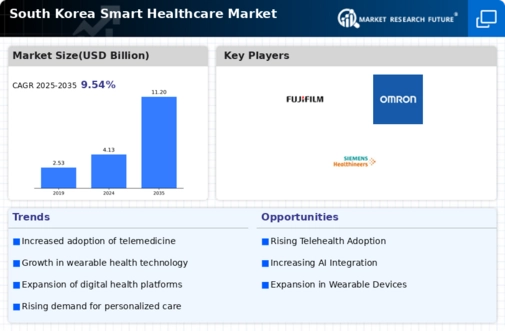Integration of IoT in Healthcare
The integration of Internet of Things (IoT) technology into healthcare systems is a pivotal driver for the smart healthcare market. In South Korea, IoT devices are increasingly being utilized for remote patient monitoring, medication management, and health data collection. This integration allows for real-time health tracking and improved patient engagement, which are essential for effective healthcare delivery. The IoT healthcare market is projected to grow significantly, with estimates suggesting it could reach $1 billion by 2025. As healthcare providers adopt IoT solutions, the smart healthcare market is expected to expand, driven by the need for more connected and efficient healthcare systems.
Government Initiatives and Support
Government policies and initiatives play a crucial role in shaping the smart healthcare market. In South Korea, the government has been actively promoting digital health solutions through various funding programs and regulatory frameworks. For example, the Ministry of Health and Welfare has launched initiatives aimed at enhancing telehealth services and digital health infrastructure. These efforts are expected to increase the adoption of smart healthcare technologies among providers and patients alike. With government support, the market is anticipated to grow at a CAGR of around 15% over the next few years, reflecting the commitment to improving healthcare accessibility and quality through innovative solutions.
Aging Population and Chronic Diseases
The demographic shift towards an aging population in South Korea is a significant driver for the smart healthcare market. As the elderly population continues to grow, the prevalence of chronic diseases is also on the rise. This demographic trend necessitates the adoption of smart healthcare solutions to manage health conditions effectively. It is estimated that by 2030, over 20% of the South Korean population will be aged 65 and older, leading to increased demand for remote monitoring and telehealth services. Consequently, healthcare providers are likely to invest in smart technologies to cater to this demographic, thereby propelling the growth of the smart healthcare market.
Technological Advancements in Healthcare
The rapid evolution of technology is a primary driver for the smart healthcare market. Innovations in artificial intelligence, machine learning, and data analytics are transforming healthcare delivery. In South Korea, the integration of these technologies into healthcare systems is enhancing patient care and operational efficiency. For instance, the market for AI in healthcare is projected to reach approximately $1.5 billion by 2025, indicating a robust growth trajectory. This technological shift not only improves diagnostic accuracy but also streamlines administrative processes, thereby reducing costs. As healthcare providers increasingly adopt these technologies, the smart healthcare market is likely to expand significantly, driven by the demand for more efficient and effective healthcare solutions.
Consumer Demand for Personalized Healthcare
There is a growing consumer demand for personalized healthcare solutions, which is driving the smart healthcare market. Patients in South Korea are increasingly seeking tailored health services that cater to their individual needs. This trend is facilitated by advancements in data analytics and wearable technology, enabling healthcare providers to offer customized treatment plans. The market for personalized medicine is expected to reach $2 billion by 2025, reflecting the shift towards more individualized care. As consumers become more health-conscious and proactive about their wellness, the smart healthcare market is likely to benefit from this demand for personalized solutions.














Leave a Comment